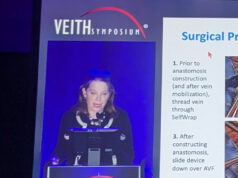 MedAlliance has announced completion of patient enrolment in the SAVE clinical trial with the Selution Sustained Limus Release (SLR) 018 drug-eluting balloon (DEB) for the treatment of failed arteriovenous fistulas (AVFs) in renal dialysis patients. Selution SLR is a “novel sirolimus-eluting balloon that provides a controlled sustained release of drug, similar to a drug-eluting stent (DES)”, states a press release.
MedAlliance has announced completion of patient enrolment in the SAVE clinical trial with the Selution Sustained Limus Release (SLR) 018 drug-eluting balloon (DEB) for the treatment of failed arteriovenous fistulas (AVFs) in renal dialysis patients. Selution SLR is a “novel sirolimus-eluting balloon that provides a controlled sustained release of drug, similar to a drug-eluting stent (DES)”, states a press release.
SAVE is a prospective multi-centre, single-blinded, randomised controlled trial. A total of 84 patients have been randomised to either standard high-pressure balloon angioplasty followed by local application of Selution SLR or high-pressure balloon angioplasty with no further lesion treatment. Subjects have been recruited at three sites in Europe and Singapore and are being followed up to 24 months. Endpoints of the study are primary patency at six months with angiographic follow up and freedom from serious adverse events at 30 days. Major secondary endpoints at six months are clinical success, freedom from serious adverse events, late lumen loss and binary vessel restenosis.
“We very much look forward to the analysis of the primary endpoint of this important trial at six months, as this is the first prospective randomised trial of a sirolimus-coated balloon in AVF patients with angiographic follow up. Furthermore, we have also measured fistula volume flow rates, which is another key index of failing or maintained fistula function. I thank MedAlliance for initiating a trial in this difficult patient population,” commented principal investigator (PI) Konstantinos Katsanos (Patras University Hospital, Patras, Greece).
“MedAlliance continues to invest in meaningful clinical trials to evaluate the safety and efficacy of Selution SLR in different patient populations”, added Jeffrey B Jump, chairman and CEO of MedAlliance. “Patients on dialysis rely on access to receive their treatment: they call this their ‘lifeline’. An AVF is considered the gold standard for haemodialysis access; however, it sometimes requires ongoing angioplasty. This is the first randomised study evaluating Selution SLR in stenotic lesions in AVF.”
MedAlliance was the first drug-eluting balloon company to receive FDA reakthrough Designation status, the press release continues. Currently three investigational device exemption (IDE) clinical studies are evaluating Selution SLR in the USA: in chronic limb-threatening ischaemia (CLTI) patients with below-the-knee (BTK) disease; superficial femoral artery (SFA) / proximal popliteal artery (PPA); and coronary in-stent restenosis (ISR). In addition, MedAlliance received IDE approval for de novo coronary artery lesions in January 2023. Selution SLR was awarded CE Mark Approval for the treatment of coronary artery disease in May 2020. This complements the substantial experience that the company has gained with the SELUTION DeNovo and SUCCESS trials in Europe and SELUTION SFA in Japan.
MedAlliance’s “unique DEB technology” involves “microreservoirs” which contain a combination of biodegradable polymer intermixed with the anti-restenotic drug sirolimus, applied as a coating on the surface of an angioplasty balloon. These provide controlled and sustained release of the drug for up to 90 days. MedAlliance’s proprietary cell adherent technology (CAT) enables the microreservoirs to be coated onto balloons and efficiently transferred to adhere to the vessel lumen when delivered via expansion of the balloon, the press release notes finally.











